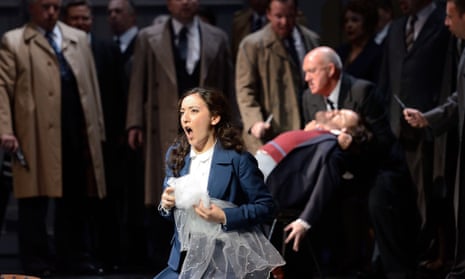Love across the sectarian divide is the subject of Bellini’s last opera, set at the time of Cromwell and the English civil war. In her bold new production for Welsh National Opera, director Annilese Miskimmon uses her native Northern Ireland and the Troubles as framework for the piece, by no means untimely.
Elvira, daughter of a Protestant Orangeman, is loved by Catholic Arturo, with the violent tension around them manifest from the beginning of the overture. But the context for act two’s celebrated scene – Bellini’s heroine unhinged by Arturo’s apparent betrayal – is brought forward as the Irish Elvira, destabilised by alternating bliss and trauma, takes pills which plunge her into psychosis. Thus the staging’s central device is to have the 17th-century action then unfold as perceived by the manic Elvira.
The further conceit of two alter egos, three centuries apart – one in her neat 70s blue suit, the other in her Puritan wedding gown, their identities variously duplicated and merged – risks losing the audience grappling with an already complex plot, though soprano Rosa Feola and actress Elena Thomas realise it well. The madness is credible for being understated, small gestures create symbolic images: Elvira slowly crushing her wedding flowers, her dizzy spinning making torn prayerbook pages float in the rush of air. More controversially, Miskimmon subverts the happily ever after ending: the returning Arturo is murdered, Elvira’s restoration to sanity fatally compromised, the chorus’s final rejoicing grisly. Yet this is less illogical than Bellini’s U-turn.
Conductor Carlo Rizzi is in his bel canto element. Musically this is most rewarding, with Feola’s coloratura gracefully poised. As Arturo, the excellent Barry Banks is never challenged by the vertical vocal leaps, and the dastardly edge David Kempster brings to the rival Riccardo is justified. Very worth seeing.
- At the Wales Millennium Centre until 4 October. Box office: 029-2063 6464. Then touring.

Comments (…)
Sign in or create your Guardian account to join the discussion